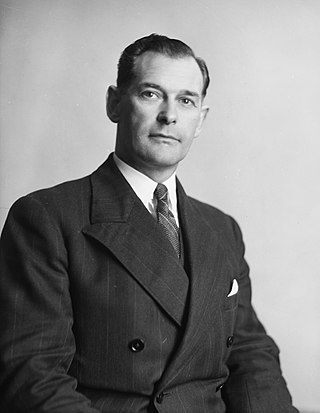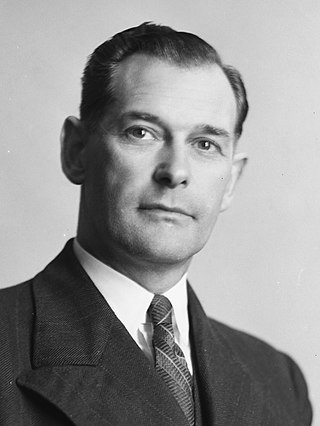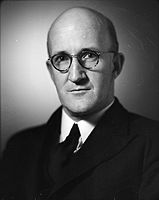
Sir Keith Jacka Holyoake, was a New Zealand politician who served as the 26th prime minister of New Zealand, serving for a brief period in 1957 and then from 1960 to 1972, and also as the 13th governor-general of New Zealand, serving from 1977 to 1980. He is the only New Zealand politician to have held both positions.

The 1972 New Zealand general election was held on 25 November to elect MPs to the 37th session of the New Zealand Parliament. The Labour Party, led by Norman Kirk, defeated the governing National Party.

The 1969 New Zealand general election was a nationwide vote to determine the shape of Parliament's 36th term. It saw the Second National Government headed by Prime Minister Keith Holyoake of the National Party win a fourth consecutive term. This is the most recent election where an incumbent government won a fourth term in office.

The 1943 New Zealand general election was a nationwide vote to determine the shape of the New Zealand Parliament's 27th term. With the onset of World War II, elections were initially postponed, but it was eventually decided to hold a general election in September 1943, around two years after it would normally have occurred. The election saw the governing Labour Party re-elected by a comfortable margin, although the party nevertheless lost considerable ground to the expanding National Party.

The 1946 New Zealand general election was a nationwide vote to determine the shape of the New Zealand Parliament's 28th term. It saw the governing Labour Party re-elected, but by a substantially narrower margin than in the three previous elections. The National Party continued its gradual rise.

The 1949 New Zealand general election was a nationwide vote to determine the shape of the New Zealand Parliament's 29th term. It saw the governing Labour Party defeated by the opposition National Party. This marked the end of the 14-year First Labour government and the beginning of the First National government.

The 1951 New Zealand general election was a nationwide vote to determine the shape of the New Zealand Parliament's 30th term. The First National Government was re-elected, with the National Party increasing its parliamentary majority over the opposition Labour Party. This was the last time until the 2020 election that a party was elected to majority government of New Zealand by receiving a majority of the vote.

The 1954 New Zealand general election was a nationwide vote to determine the shape of the New Zealand Parliament's 31st term. It saw the governing National Party remain in office, but with a slightly reduced majority. It also saw the debut of the new Social Credit Party, which won more than eleven percent of the vote but failed to win a seat.

The 1957 New Zealand general election was a nationwide vote to determine the shape of the New Zealand Parliament's 32nd term. It saw the governing National Party narrowly defeated by the Labour Party. The 1957 elections marked the beginning of the second Labour government, although this administration was to last only a single term.

The 1960 New Zealand general election was a nationwide vote to determine the shape of the New Zealand Parliament's 33rd term. It saw the governing Labour Party defeated by the National Party, putting an end to the short second Labour government.

The 1966 New Zealand general election was a nationwide vote to determine the shape of the New Zealand Parliament's 35th term. It saw the governing National Party win a third consecutive term in office. It was also the first time since the 1943 election that a minor party won a seat in Parliament.
Barry Selwyn Gustafson is a New Zealand political scientist and historian, and a leading political biographer. He served for nearly four decades as professor of political studies at the University of Auckland, and as Acting Director of the New Zealand Asia Institute from 2004 to 2006. He has contested various general elections, first for the Labour Party and later for the National Party, coming second each time.

The 31st New Zealand Parliament was a term of the New Zealand Parliament. It was elected at the 1954 general election on 13 November of that year.

The 32nd New Zealand Parliament was a term of the New Zealand Parliament. It was elected at the 1957 general election on 30 November of that year.

The 33rd New Zealand Parliament was a term of the New Zealand Parliament. It was elected at the 1960 general election on 26 November of that year.

The 34th New Zealand Parliament was a term of the New Zealand Parliament. It was elected at the 1963 general election on 30 November of that year.

The 35th New Zealand Parliament was a term of the New Zealand Parliament. It was elected at the 1966 general election on 26 November of that year.

The 36th New Zealand Parliament was a term of the New Zealand Parliament. It was elected at the 1969 general election on 29 November of that year.

The Hutt by-election of 1968 was a by-election for the electorate of Hutt on 3 August 1968 during the 35th New Zealand Parliament.

The Northern Maori by-election of 1963 was a by-election for the electorate of Northern Maori on 16 March 1963 during the 33rd New Zealand Parliament. The by-election resulted from the death of the previous member Tapihana Paikea on 7 January 1963. It was held the same day as the Otahuhu by-election.















